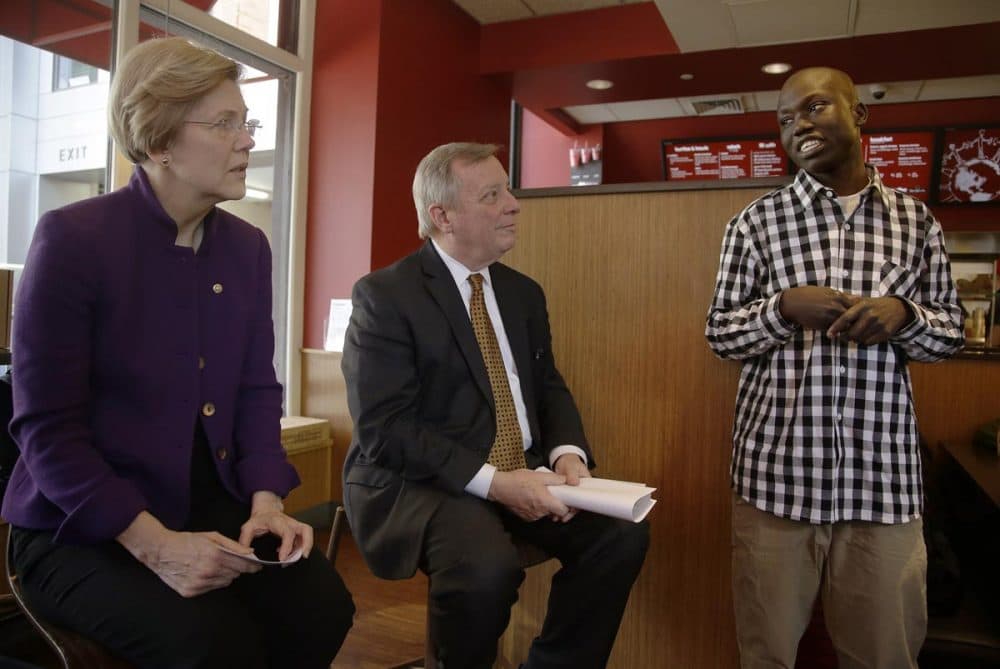Advertisement
What The Research Says In The Minimum Wage Debate
Resume
The latest in an occasional segment we call "Policy Shop"
David Scharfenberg: The minimum wage is a big issue all over the country right now. President Obama wants to hike it to $10.10 an hour. And here in Massachusetts, lawmakers want to do him one better: They're talking about about a minimum wage of $10.50, or more.
Now, whenever there's a debate about the minimum wage, we hear a lot of the same talking points. Some in the business community say a higher wage will drive up costs and kill jobs. Advocates insist it won't kill jobs. And some suggest it's a boon to low-income families; they say it's not just a bunch of middle-class teenagers scooping ice cream who would benefit.
Host Deborah Becker: OK, so who's right?
Well, it turns out there's just no easy answer. It really depends on how you look at the data.
Let's turn first to who would benefit from hiking the minimum wage to $10.50 in Massachusetts. (See here for six pie charts on who would benefit.)
The left-leaning Economic Policy Institute (EPI) crunched some 2013 census data for me. And when it comes to the question of age, here's what they found: Just one in five people in Massachusetts who would get a pay hike is a teenager. But more than half are under age 30 — some of them, no doubt, all those 20-somethings still living with their parents.
So it's not all 16-year-olds, but it's a pretty young population.
That's right. Three-quarters don't have kids. And almost two-thirds live in a household earning at least $40,000 a year — that's everyone's income combined.
So you put that all together — younger workers, many of them childless, many in households well above the poverty line — and the conclusion for economists like David Neumark at the University of California, Irvine is pretty clear: "We know very well, and nobody disagrees, that minimum wages do not target poor families well," he told me in an interview.
Neumark says there's a much better device for tackling poverty: the Earned Income Tax Credit, or EITC. The credit is a direct payout to low-income families who work.
"It encourages work," he said of the EITC. "The second [element] is, it targets those benefits to poor families. You can't get anything from the EITC if you're a high-income family."
Most economists and advocates would agree that the EITC is a more efficient anti-poverty tool than the minimum wage. But many say it's not an either-or proposition.
Douglas Hall at the EPI, which crunched the numbers for WBUR, says in an age of stagnant wages, bringing up the floor — bringing up the minimum wage — is good for everyone.
"It certainly helps lower-income folks," Hall said. "But one of the things we like about the minimum wage is that it can also be a tool that helps families really across the income spectrum. We like to think of this not necessarily first and foremost as a tool to end poverty, but instead as a basic labor standard."
So that's the scoop on who would benefit from a hike in the minimum wage: plenty of low-income families, but lots of other people, too.
There's also a debate about whether raising the minimum wage leads to job loss?
That's right. And the debate really boils down to which researcher has the best control group.
Let me explain. If you're testing a new medication, you give it to a bunch of sick people. Then you have a control group that gets a placebo. And you see if there's any real difference.
In economics, it's not that easy. Economists have to study a messy real world and they're trying to find the best comparisons they can.
Economists like UC Irvine's Neumark compare states that raise the minimum wage to those that don't, and they have found job loss in states with higher minimum wages.
But economists like Arin Dube, of the University of Massachusetts Amherst, say, look, there are just too many differences between, say, the Massachusetts and Texas economies to make a valid comparison.
"You really want to have comparisons of high- and low-minimum-wage states that are more apples-to-apples, that actually have similar underlying trajectories," Dube said.
So Dube and his co-authors did something pretty clever. They looked at neighboring states, with different minimum wages, and they compared counties on either side of the state line. In the end, they found hiking the minimum wage had no negative impact on employment.
But I take it not everyone is buying this research?
That's right. Neumark, for one, says just because two counties border each other does not mean they make for the best comparison. They can, in fact, be quite different.
So the debate goes on and on. And it can seem a little academic. But with all the talk about the minimum wage and economic inequality these days, it's pretty high stakes.
The Massachusetts House and Senate have passed separate versions of the minimum wage hike and they're reconciling those two versions now.
This segment aired on April 28, 2014.